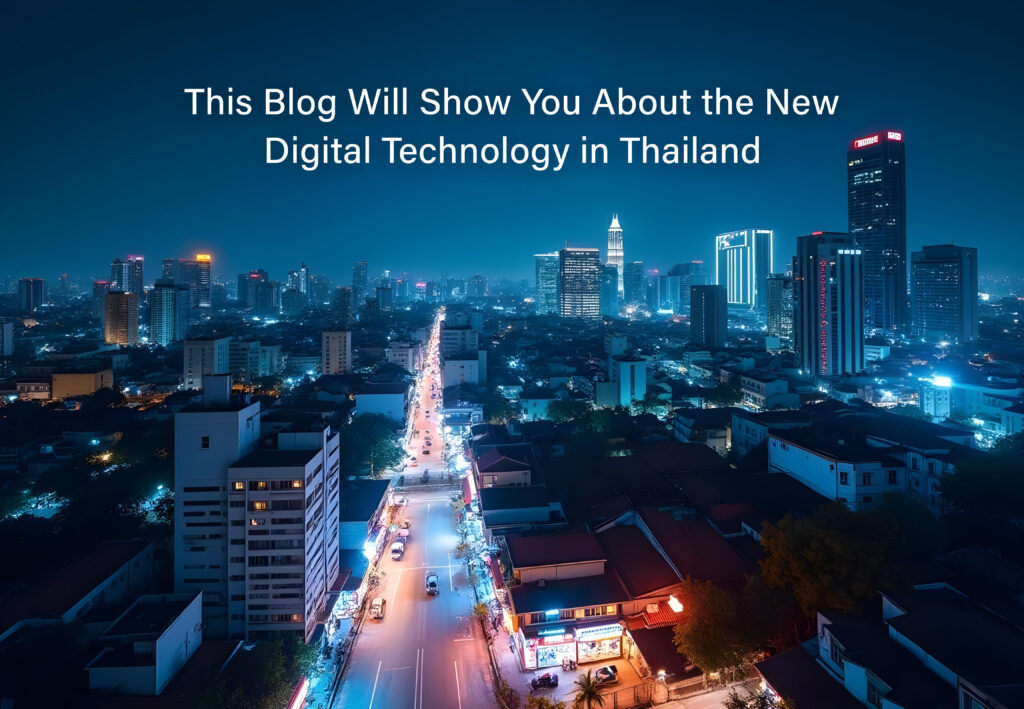In today’s world, digital technology is evolving at a pace that’s hard to keep up with, and Thailand is no exception. This blog will show you about the new digital technology in Thailand, diving deep into how the country is embracing innovations that are changing industries, improving everyday life, and boosting the economy. Thailand has become a hotspot for digital transformation, driven by a combination of government initiatives, private sector innovation, and growing interest from tech startups. From AI to 5G, and from healthcare to education, Thailand is on the cutting edge of digital progress.
Table of Contents
Overview of the New Digital Technology Landscape in Thailand
This blog will show you about the new digital technology in Thailand, where the landscape is expanding rapidly. One of the most significant contributors to this growth is Thailand’s focus on Thailand 4.0, a government policy aimed at promoting technology and innovation to move the country toward a knowledge-based economy. The adoption of 5G networks is one of the key elements driving change, offering faster internet speeds and enhancing communication for both businesses and consumers.
Moreover, Artificial Intelligence (AI) is gaining momentum across different sectors in Thailand, from manufacturing to retail. Companies are using AI to streamline processes, reduce costs, and enhance customer experiences. Along with this, blockchain technology is being used to revolutionize industries like finance and real estate, providing more secure and transparent systems.
Key Sectors Embracing New Digital Technology in Thailand
As this blog will show you about the new digital technology in Thailand, it’s essential to explore the industries that are adopting these advancements. One of the leading sectors is healthcare, where digital technologies are transforming the way care is provided. Telemedicine, for example, has become increasingly popular, especially in remote areas. With improved connectivity through 5G, doctors can now diagnose and treat patients remotely, providing better access to healthcare services. AI also plays a key role in this sector by assisting in diagnostics and predicting patient outcomes based on data, significantly improving efficiency and accuracy.
Another sector seeing substantial changes is education. The introduction of EdTech (Educational Technology) has reshaped traditional learning methods, with virtual classrooms, e-learning platforms, and digital resources now widely used. This shift was accelerated during the pandemic when schools and universities needed to adapt to remote learning. Now, even after the pandemic, EdTech remains crucial, with platforms like Coursera and local Thai services allowing students to access courses from anywhere. These innovations are not only making education more accessible but also helping to prepare the workforce for a tech-driven future.
Impact of New Digital Technology on Thailand’s Economy
The economic implications of new digital technology in Thailand are profound. The rise of technology-focused startups has created a thriving tech ecosystem in the country. Companies are investing heavily in developing digital solutions, from financial tech (FinTech) to agricultural tech (AgriTech). These startups are helping traditional businesses digitize their operations, making them more competitive both locally and globally. Thailand’s vibrant startup scene is supported by government initiatives like the Digital Economy Promotion Agency (DEPA), which helps drive investment and innovation in tech-related fields.

In addition to boosting the tech startup ecosystem, digital technology is transforming Thailand’s job market. With the demand for skilled workers in areas like AI, data science, and cybersecurity rising, many Thais are upskilling to meet these needs. Local companies, along with multinational corporations, are looking for talent that can help them navigate the digital age. This shift is also promoting a wave of digital entrepreneurship, with many young professionals venturing into tech-based businesses. As a result, the overall economic landscape of Thailand is being reshaped, moving toward a more tech-driven future.
Challenges in Adopting New Digital Technology in Thailand
While this blog will show you about the new digital technology in Thailand, it’s also important to discuss the challenges that come with this transformation. One of the primary obstacles is the digital infrastructure. Despite the rapid rollout of 5G, there are still areas, particularly in rural parts of Thailand, where connectivity is limited. This digital divide means that while urban centers like Bangkok enjoy the benefits of fast internet and digital services, other regions may lag behind. Efforts are underway to improve the country’s digital infrastructure, but it remains a significant challenge for widespread adoption of new technologies.
Another challenge is the regulatory environment. As new technologies like blockchain and AI evolve, regulations surrounding data privacy and security are still catching up. For businesses, navigating these regulations can be tricky, particularly when it comes to data protection laws that govern how personal information is collected and used. Moreover, ensuring that these regulations do not stifle innovation while protecting consumers is a delicate balance. Thailand’s policymakers are working on frameworks that will support innovation while ensuring compliance with global standards, but it remains an ongoing effort.
Future Trends in New Digital Technology in Thailand
Looking ahead, this blog will show you about the new digital technology in Thailand and how the future is likely to unfold. One of the most promising trends is the expansion of Artificial Intelligence (AI). AI is expected to play a critical role in various industries, from agriculture to finance. For instance, AI-driven tools can help farmers monitor crop health, predict yields, and optimize resources, making agriculture more efficient. In finance, AI is being used to detect fraudulent transactions, automate customer service through chatbots, and provide personalized financial advice.
Another significant trend is the growth of the Internet of Things (IoT). As more devices become connected, IoT will transform everyday life in Thailand. Smart cities are a prime example, where connected systems manage everything from traffic flow to waste management. Bangkok, for instance, is already experimenting with smart city technology, aiming to improve quality of life for its citizens through better resource management. In the coming years, we can expect to see more cities across Thailand adopting similar technologies, making daily life more convenient and sustainable.
Conclusion
In summary, this blog has shown you about the new digital technology in Thailand and how it is reshaping various sectors and the economy at large. From healthcare and education to startups and smart cities, digital technology is leaving a lasting impact on Thailand’s growth. While there are challenges such as infrastructure limitations and regulatory hurdles, the potential for future development is immense. Thailand is on a clear path to becoming a digital leader in Southeast Asia, with innovations in AI, IoT, and 5G paving the way. For businesses and individuals alike, staying updated on these trends is essential to thrive in this rapidly changing landscape.
READ MORE : Geekzilla Autos: Pioneering the Future of Automotive Technology


